牛津译林版八年级上册英语Unit 6 Bird watching Grammar Using to-infinitives for purpose 课件(共27张PPT)
文档属性
| 名称 | 牛津译林版八年级上册英语Unit 6 Bird watching Grammar Using to-infinitives for purpose 课件(共27张PPT) |
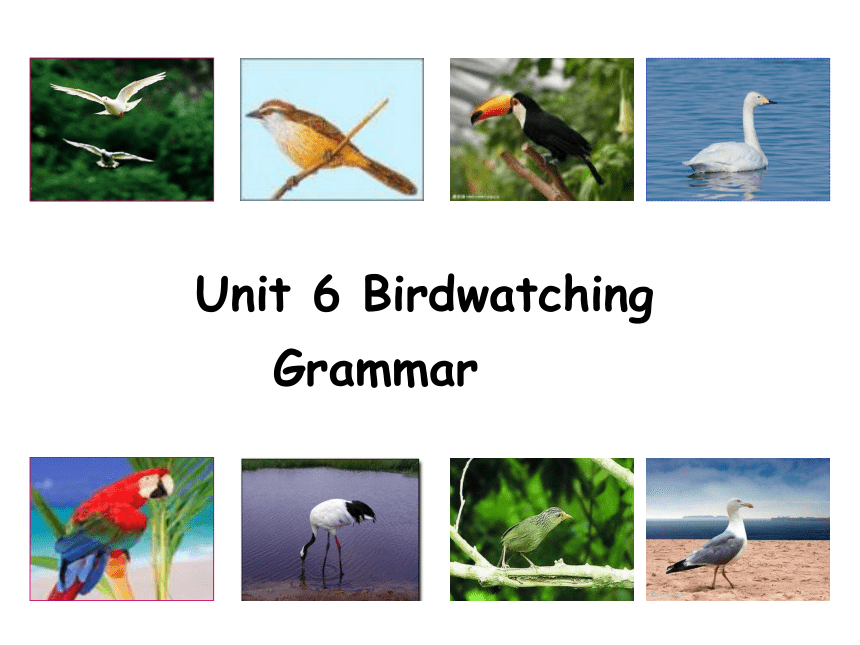
|
|
| 格式 | ppt | ||
| 文件大小 | 4.0MB | ||
| 资源类型 | 教案 | ||
| 版本资源 | 牛津译林版 | ||
| 科目 | 英语 | ||
| 更新时间 | 2022-11-24 00:00:00 | ||
图片预览

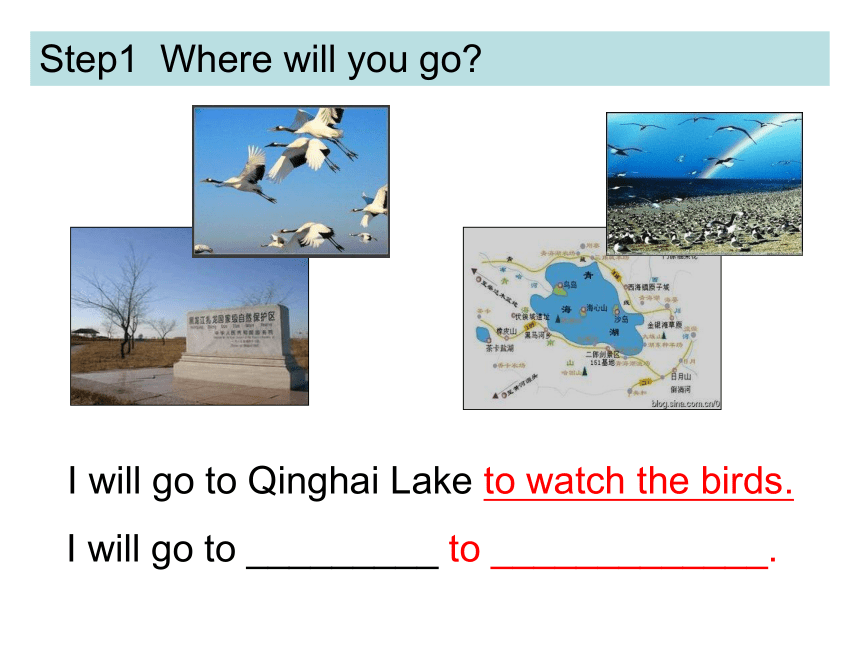
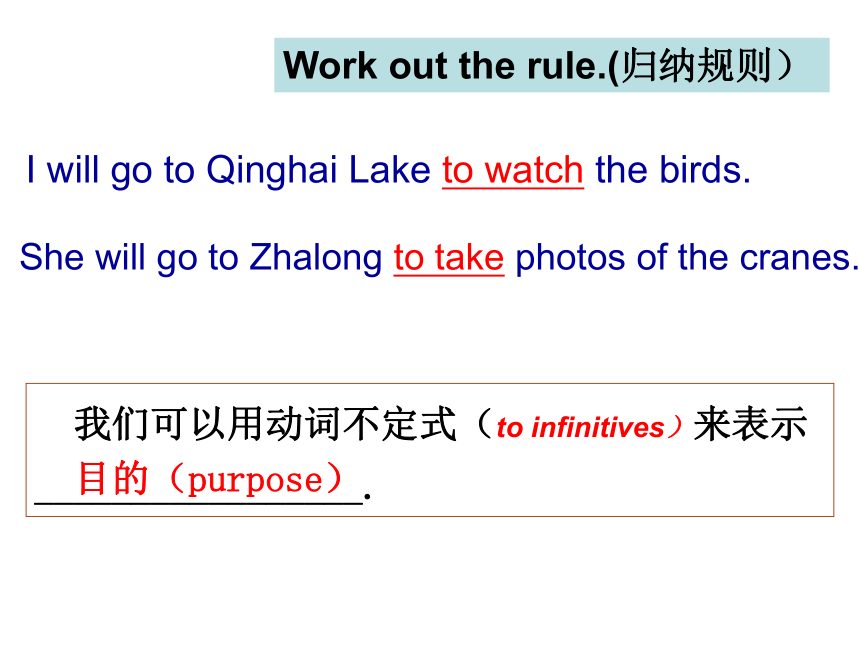
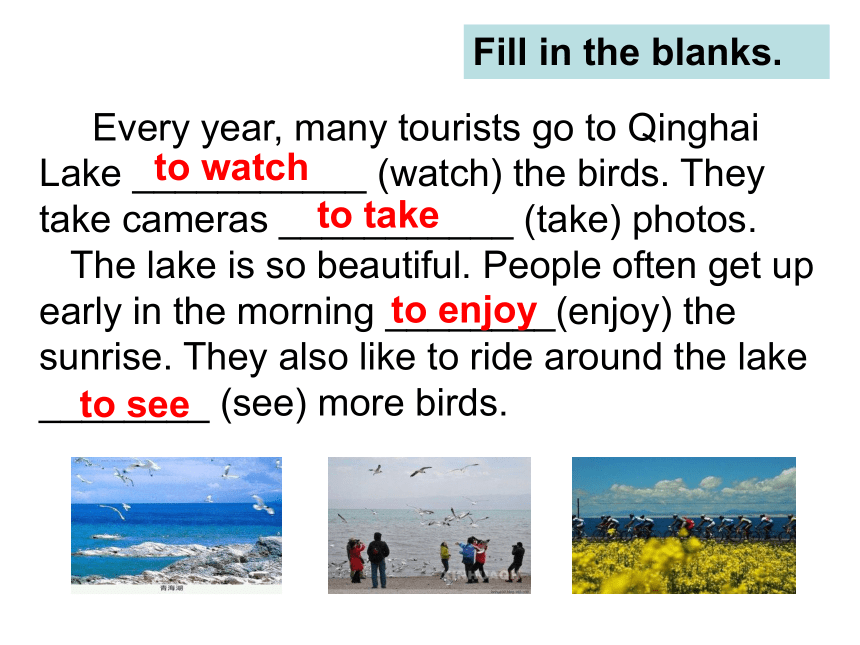
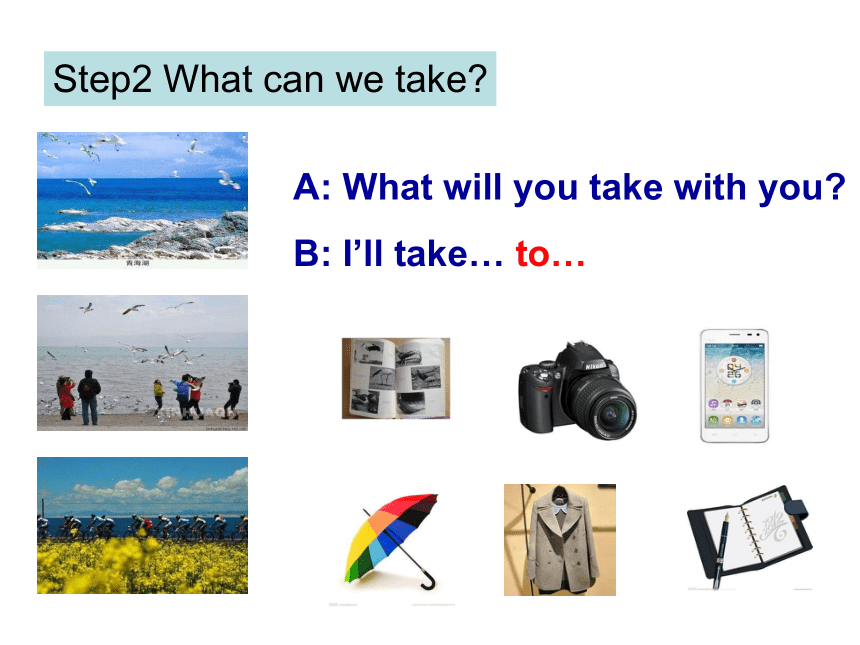
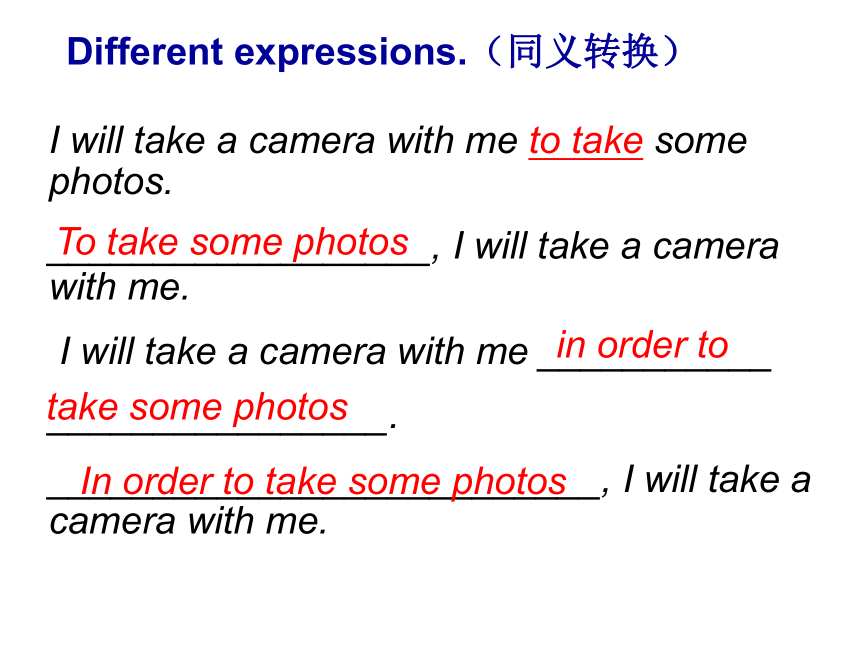
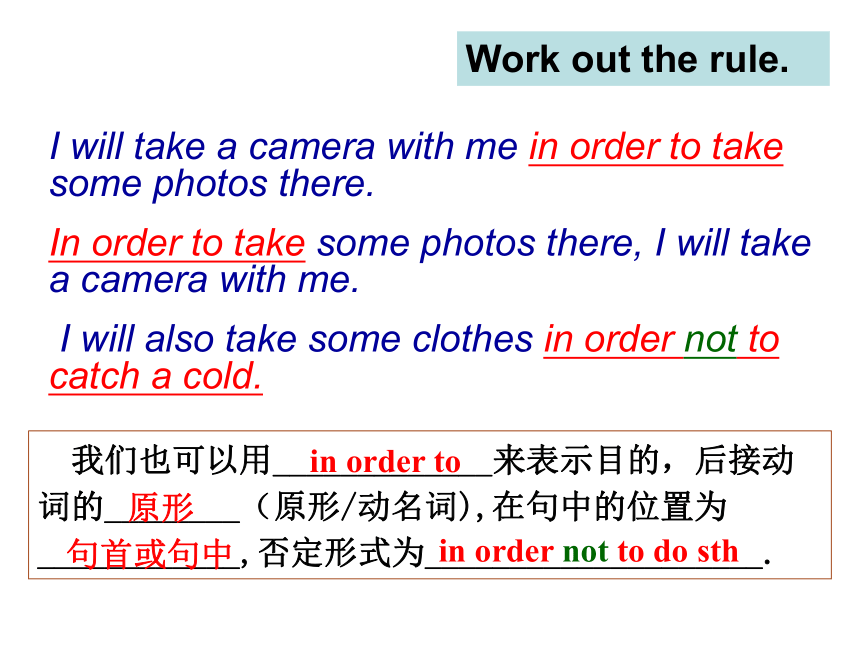
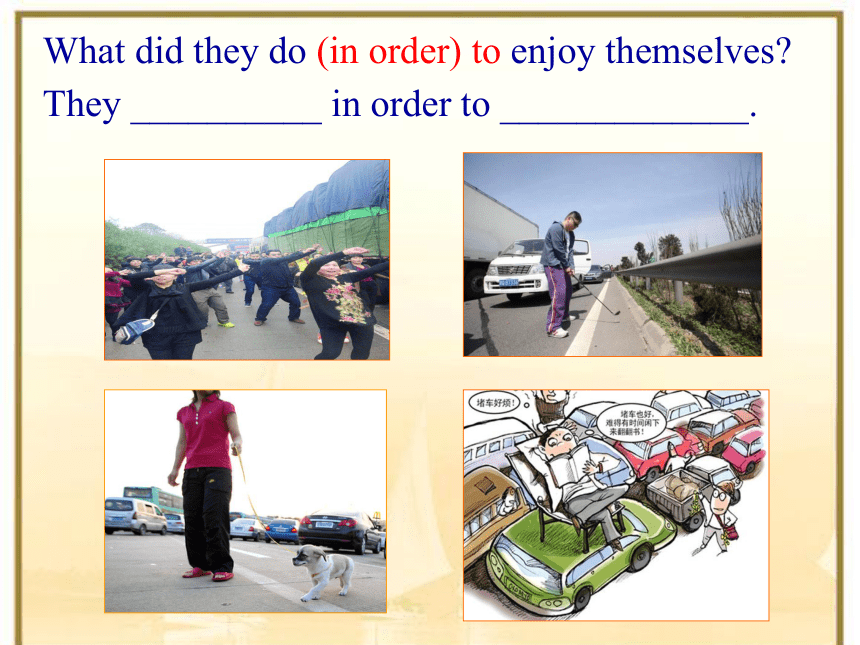
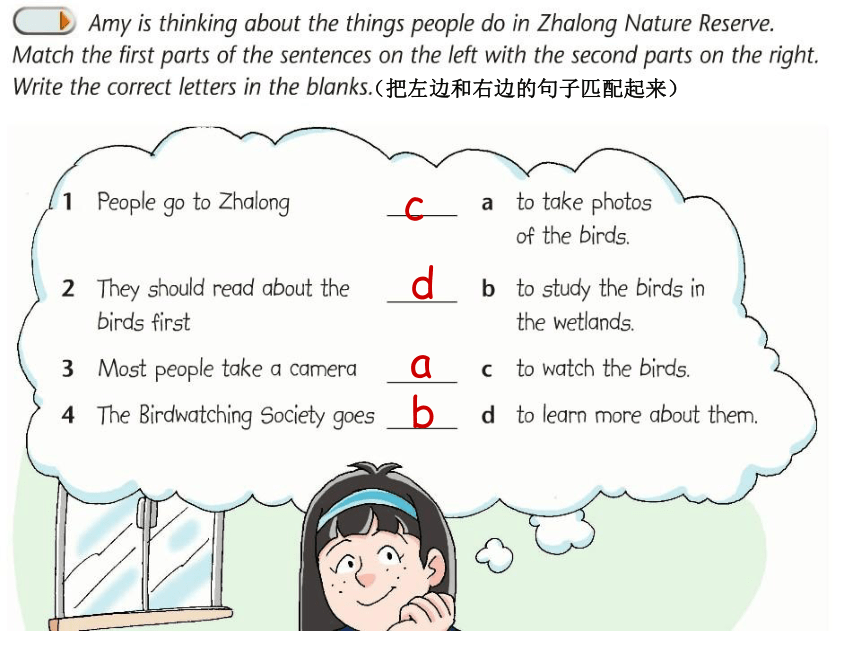
文档简介
(共27张PPT)
Unit 6 Birdwatching
Grammar
Step1 Where will you go
I will go to Qinghai Lake to watch the birds.
I will go to _________ to _____________.
我们可以用动词不定式(to infinitives)来表示_________________.
I will go to Qinghai Lake to watch the birds.
She will go to Zhalong to take photos of the cranes.
Work out the rule.(归纳规则)
目的(purpose)
Every year, many tourists go to Qinghai
Lake ___________ (watch) the birds. They take cameras ___________ (take) photos.
The lake is so beautiful. People often get up early in the morning ________(enjoy) the sunrise. They also like to ride around the lake ________ (see) more birds.
Fill in the blanks.
to watch
to take
to enjoy
to see
A: What will you take with you
B: I’ll take… to…
Step2 What can we take
I will take a camera with me to take some photos.
__________________, I will take a camera with me.
I will take a camera with me ___________
________________.
__________________________, I will take a camera with me.
Different expressions.(同义转换)
To take some photos
in order to
take some photos
In order to take some photos
Work out the rule.
我们也可以用_____________来表示目的,后接动词的________(原形/动名词),在句中的位置为____________,否定形式为____________________.
in order to
原形
I will take a camera with me in order to take some photos there.
In order to take some photos there, I will take a camera with me.
I will also take some clothes in order not to catch a cold.
句首或句中
in order not to do sth
What did they do (in order) to enjoy themselves
They __________ in order to _____________.
c
d
a
b
(把左边和右边的句子匹配起来)
the Birdwatching Society
They invite people to help them.
They need more people to count and describe
the birds.
一些动词后面动词不定式作宾语补足语.
Work out the rule.
类似的动词有哪些?
They invite people to help them.
They need more people to count and describe
the birds.
sb (not) to do sth.
invite
advise
want
tell
ask
teach
need
encourage
wish
order
….
I will invite _____ to go birdwatching with me.
I need/want him/her to_____.
Step3 Who will you invite Why
Step4. What will your parents say
What will your parents tell/ ask… you
to do/ not to do
What does he tell/ encourage us (not) to do
Nick Vujicic speaker(演讲家)
What does he tell/encourage us (not) to do
Nick Vujicic
speaker(演讲家)
Be patient.
Be thankful.
Dream big.
Don’t give up(放弃).
Don’t be afraid of difficulties(困难).
We can see a parrot dance to music.
We can hear a bird make different sounds.
We can hear a parrot sing songs.
We can hear a parrot speak English.
一些动词后接动词不定式作宾语补足语,不加to.常见动词有__________________________________
___________________.
注意:______后面可加to,也可不加to.
let, make, have, see, hear, listen to,
help
watch, find, notice…
What can you see the birds do in the video
What can you hear the birds do
A: What do you want to do in your free time
B: …
A: Do your parents let/make you …
B: …
If I have a parrot,
I’ll tell it________.
I’ll teach it________.
I will hear it ________.
I will see it _________.
I will help it __________.
That will make me ________.
Finish the exercises on page 74.
Mr Wu _______us __________ a pair of comfortable shoes because we would have to walk a long way (ask/ wear).
2. We _________some birds ________ in the trees( hear / sing).
3. Mr Wu _________us __________the birds carefully (tell/ watch).
4. He also _________us __________ the birds (want/ describe).
asked to wear
heard sing
told to watch
wanted to describe
Check the answers.
5. He _________ us _____________ in the wetlands( advise/ not shout).
6. The cold weather _________some birds ________ south for the winter( make / fly).
7. The trip _________us __________more about wild life (help/ learn).
advised not to shout
made
fly
helped (to) learn
Check the answers.
The birds have so many problems. What can we do to help them
Step5. What to do to protect the birds.
Problems
Hunters catch them and sell
them at the market.
Step5. What to do to protect the birds.
People make the
wetlands smaller to build
farms and buildings
Fishermen keep
Fishing there.
Problems
Tourists drop lots of litter.
We can tell/ ask/ advise/ encourage/ make/ help…
Written work
Write a short passage about your plan for watching the birds. Try to use “to infinitives” as much as possible.
Thank you!
Goodbye!
Unit 6 Birdwatching
Grammar
Step1 Where will you go
I will go to Qinghai Lake to watch the birds.
I will go to _________ to _____________.
我们可以用动词不定式(to infinitives)来表示_________________.
I will go to Qinghai Lake to watch the birds.
She will go to Zhalong to take photos of the cranes.
Work out the rule.(归纳规则)
目的(purpose)
Every year, many tourists go to Qinghai
Lake ___________ (watch) the birds. They take cameras ___________ (take) photos.
The lake is so beautiful. People often get up early in the morning ________(enjoy) the sunrise. They also like to ride around the lake ________ (see) more birds.
Fill in the blanks.
to watch
to take
to enjoy
to see
A: What will you take with you
B: I’ll take… to…
Step2 What can we take
I will take a camera with me to take some photos.
__________________, I will take a camera with me.
I will take a camera with me ___________
________________.
__________________________, I will take a camera with me.
Different expressions.(同义转换)
To take some photos
in order to
take some photos
In order to take some photos
Work out the rule.
我们也可以用_____________来表示目的,后接动词的________(原形/动名词),在句中的位置为____________,否定形式为____________________.
in order to
原形
I will take a camera with me in order to take some photos there.
In order to take some photos there, I will take a camera with me.
I will also take some clothes in order not to catch a cold.
句首或句中
in order not to do sth
What did they do (in order) to enjoy themselves
They __________ in order to _____________.
c
d
a
b
(把左边和右边的句子匹配起来)
the Birdwatching Society
They invite people to help them.
They need more people to count and describe
the birds.
一些动词后面动词不定式作宾语补足语.
Work out the rule.
类似的动词有哪些?
They invite people to help them.
They need more people to count and describe
the birds.
sb (not) to do sth.
invite
advise
want
tell
ask
teach
need
encourage
wish
order
….
I will invite _____ to go birdwatching with me.
I need/want him/her to_____.
Step3 Who will you invite Why
Step4. What will your parents say
What will your parents tell/ ask… you
to do/ not to do
What does he tell/ encourage us (not) to do
Nick Vujicic speaker(演讲家)
What does he tell/encourage us (not) to do
Nick Vujicic
speaker(演讲家)
Be patient.
Be thankful.
Dream big.
Don’t give up(放弃).
Don’t be afraid of difficulties(困难).
We can see a parrot dance to music.
We can hear a bird make different sounds.
We can hear a parrot sing songs.
We can hear a parrot speak English.
一些动词后接动词不定式作宾语补足语,不加to.常见动词有__________________________________
___________________.
注意:______后面可加to,也可不加to.
let, make, have, see, hear, listen to,
help
watch, find, notice…
What can you see the birds do in the video
What can you hear the birds do
A: What do you want to do in your free time
B: …
A: Do your parents let/make you …
B: …
If I have a parrot,
I’ll tell it________.
I’ll teach it________.
I will hear it ________.
I will see it _________.
I will help it __________.
That will make me ________.
Finish the exercises on page 74.
Mr Wu _______us __________ a pair of comfortable shoes because we would have to walk a long way (ask/ wear).
2. We _________some birds ________ in the trees( hear / sing).
3. Mr Wu _________us __________the birds carefully (tell/ watch).
4. He also _________us __________ the birds (want/ describe).
asked to wear
heard sing
told to watch
wanted to describe
Check the answers.
5. He _________ us _____________ in the wetlands( advise/ not shout).
6. The cold weather _________some birds ________ south for the winter( make / fly).
7. The trip _________us __________more about wild life (help/ learn).
advised not to shout
made
fly
helped (to) learn
Check the answers.
The birds have so many problems. What can we do to help them
Step5. What to do to protect the birds.
Problems
Hunters catch them and sell
them at the market.
Step5. What to do to protect the birds.
People make the
wetlands smaller to build
farms and buildings
Fishermen keep
Fishing there.
Problems
Tourists drop lots of litter.
We can tell/ ask/ advise/ encourage/ make/ help…
Written work
Write a short passage about your plan for watching the birds. Try to use “to infinitives” as much as possible.
Thank you!
Goodbye!
